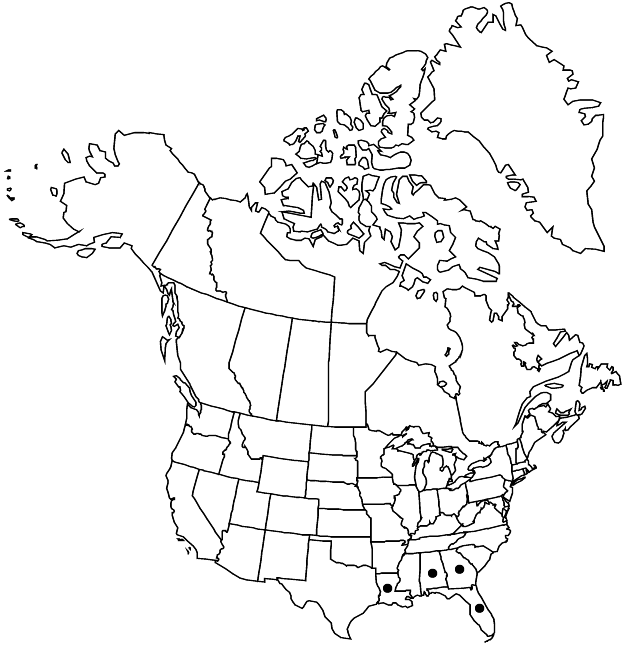Difference between revisions of "Paronychia patula"
Sida 1: 102. 1962.
FNA>Volume Importer |
imported>Volume Importer |
||
| (5 intermediate revisions by one other user not shown) | |||
| Line 8: | Line 8: | ||
}} | }} | ||
|common_names=Pineland nailwort | |common_names=Pineland nailwort | ||
| − | |basionyms={{Treatment/ID/ | + | |special_status={{Treatment/ID/Special_status |
| + | |code=E | ||
| + | |label=Endemic | ||
| + | }} | ||
| + | |basionyms={{Treatment/ID/Basionym | ||
|name=Siphonychia diffusa | |name=Siphonychia diffusa | ||
|authority=Chapman | |authority=Chapman | ||
| + | |rank=species | ||
| + | |publication_title=Fl. South. U.S., | ||
| + | |publication_place=47. 1860, | ||
}} | }} | ||
|synonyms= | |synonyms= | ||
| Line 27: | Line 34: | ||
|elevation=0-100 m | |elevation=0-100 m | ||
|distribution=Ala.;Fla.;Ga.;La. | |distribution=Ala.;Fla.;Ga.;La. | ||
| − | |discussion=<p>The Louisiana record of Paronychia patula, based on a specimen at NY, is questionable.</p> | + | |discussion=<p>The Louisiana record of <i>Paronychia patula</i>, based on a specimen at NY, is questionable.</p> |
|tables= | |tables= | ||
|references= | |references= | ||
| Line 36: | Line 43: | ||
-->{{#Taxon: | -->{{#Taxon: | ||
name=Paronychia patula | name=Paronychia patula | ||
| − | |||
|authority=Shinners | |authority=Shinners | ||
|rank=species | |rank=species | ||
| Line 50: | Line 56: | ||
|publication title=Sida | |publication title=Sida | ||
|publication year=1962 | |publication year=1962 | ||
| − | |special status= | + | |special status=Endemic |
| − | |source xml=https:// | + | |source xml=https://bitbucket.org/aafc-mbb/fna-data-curation/src/2e0870ddd59836b60bcf96646a41e87ea5a5943a/coarse_grained_fna_xml/V5/V5_78.xml |
|subfamily=Caryophyllaceae subfam. Paronychioideae | |subfamily=Caryophyllaceae subfam. Paronychioideae | ||
|genus=Paronychia | |genus=Paronychia | ||
Latest revision as of 22:13, 5 November 2020
Plants annual or rarely short-lived perennial; taproot filiform to slender. Stems prostrate to erect, much-branched, 5–50 cm, retrorsely pubescent throughout. Leaves: stipules lanceolate, 1.5–7 mm, apex acuminate, entire; blade linear-oblong to oblanceolate, 3–20 × 0.5–3 mm, herbaceous, apex obtuse to subacute, sparsely antrorsely pubescent. Cymes terminal and lateral, 15–50+-flowered, densely congested, ± spheroid clusters 3–5 mm wide. Flowers 5-merous, cylindric, with enlarged hypanthium and calyx constricted then widening distally, 1.2–2.2 mm, pubescent, sometimes only slightly so, mostly proximally with straight or usually hooked hairs; sepals red-brown, white distally, midrib and lateral pair of veins becoming prominent, linear to oblong, 0.6–1.2 mm, papery, margins white, 0.03–0.1 mm wide, papery, apex terminated by mucro, hood obscure, narrowly rounded, mucro short-conic, 0.05–0.1 mm, glabrous; staminodes triangular, 0.2–0.4 mm; style 1, cleft (2- or 3-lobed) in distal 1/5, 0.5–1.3 mm. Utricles ovoid to subglobose, 0.4–0.6 mm, ± smooth, glabrous.
Phenology: Flowering spring–fall.
Habitat: Sandhills, woodlands, fields, clearings, roadsides
Elevation: 0-100 m
Distribution

Ala., Fla., Ga., La.
Discussion
The Louisiana record of Paronychia patula, based on a specimen at NY, is questionable.
Selected References
None.